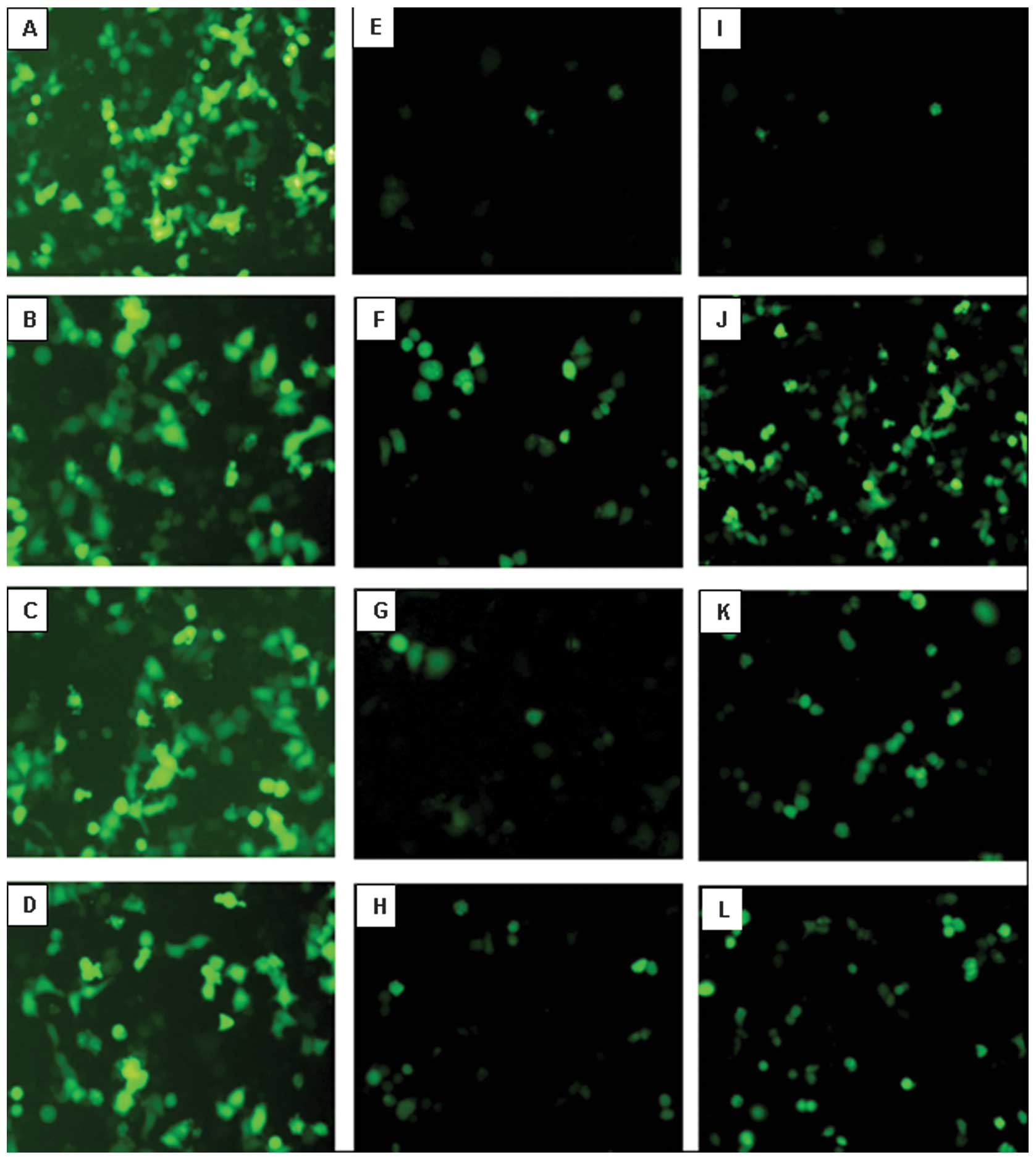|
1.
|
Ishiwata N, Inase N, Fujie T, et al:
Suicide gene therapy using keratin 19 enhancer and promoter in
malignant mesothelioma cells. Anticancer Res. 23:1405–1409.
2003.PubMed/NCBI
|
|
2.
|
Chapel-Fernandes S, Jordier F, Lauro F, et
al: Use of the PSA enhancer core element to modulate the expression
of prostate-and non-prostate-specific basal promoters in a
lentiviral vector context. Cancer Gene Ther. 13:919–929. 2006.
View Article : Google Scholar : PubMed/NCBI
|
|
3.
|
Li S, MacLaughlin FC, Fewell JG, et al:
Muscle-specific enhancement of gene expression by incorporation of
SV40 enhancer in the expression plasmid. Gene Ther. 8:494–497.
2001. View Article : Google Scholar : PubMed/NCBI
|
|
4.
|
Li HS, Liu Y, Li DF, et al: Enhancement of
DNA vaccine-induced immune responses by a 72-bp element from SV40
enhancer. Chin Med J. 120:496–502. 2007.PubMed/NCBI
|
|
5.
|
Vlodavsky I, Friedmann Y, Elkin M, et al:
Mammalian heparanase: gene cloning; expression and function in
tumor progression and metastasis. Nat Med. 5:793–802. 1999.
View Article : Google Scholar : PubMed/NCBI
|
|
6.
|
Hulett MD, Freeman C, Hamdorf BJ, et al:
Cloning of mammalian heparanase; an important enzyme in tumor
invasion and metastasis. Nat Med. 5:803–809. 1999. View Article : Google Scholar : PubMed/NCBI
|
|
7.
|
Toyoshima M and Nakajima M: Human
heparanase. Purification, characterization, cloning and expression.
J Biol Chem. 274:24153–24160. 1999. View Article : Google Scholar : PubMed/NCBI
|
|
8.
|
Kussie PH, Hulmes JD, Ludwig DL, et al:
Cloning and functional expression of a human heparanase gene.
Biochem Biophys Res Commun. 261:183–187. 1999. View Article : Google Scholar : PubMed/NCBI
|
|
9.
|
El-Assal ON, Yamanoi A, Ono T, et al: The
clinicopathological significance of heparanase and basic fibroblast
growth factor expressions in hepatocellular carcinoma. Clin Cancer
Res. 7:1299–1305. 2001.PubMed/NCBI
|
|
10.
|
Chen XP, Liu YB, Rui J, et al: Heparanase
mRNA expression and point mutation in hepatocellular carcinoma.
World J Gastroenterol. 10:2795–2799. 2004.PubMed/NCBI
|
|
11.
|
Komatsu N, Waki M, Sue M, et al:
Heparanase expression in B16 melanoma cells and peripheral blood
neutrophils before and after extravasation detected by novel
anti-mouse heparanase monoclonal antibodies. J Immunol Methods.
331:82–93. 2008. View Article : Google Scholar
|
|
12.
|
Ilan N, Elkin M and Vlodavsky I:
Regulation, function and clinical significance of heparanase in
cancer metastasis and angiogenesis. Int J Biochem Cell Biol.
38:2018–2039. 2006. View Article : Google Scholar : PubMed/NCBI
|
|
13.
|
Chen XP, Hu LH, Cui W, et al: Activity and
tumor specificity of of human heparanase gene core promoter. Mol
Med Rep. (In press).
|
|
14.
|
Boyd DD and Nakajima M: Involvement of
heparanase in tumor metastases: a new target in cancer therapy? J
Natl Cancer Inst. 96:1194–1195. 2004. View Article : Google Scholar : PubMed/NCBI
|
|
15.
|
Yang JM, Wang HJ, Du L, et al: Screening
and identification of novel B cell epitopes in human heparanase and
their anti-invasion property for hepatocellular carcinoma. Cancer
Immunol Immunother. 58:1387–1396. 2009. View Article : Google Scholar : PubMed/NCBI
|
|
16.
|
Jiang P, Kumar A, Parrillo JE, et al:
Cloning and characterization of the human heparanase-1 (HPR1) gene
promoter. Role of GA-binding protein and Sp1 in regulating HPR1
BASAL promoter activity. J Biol Chem. 277:8989–8998. 2002.
View Article : Google Scholar : PubMed/NCBI
|
|
17.
|
de Mestre AM, Rao S, Hornby JR, et al:
Early growth response gene 1 (EGR1) regulates heparanase gene
transcription in tumor cells. J Biol Chem. 280:35136–35147.
2005.
|
|
18.
|
Wasylyk B, Wasylyk C, Augereau P, et al:
The SV40 72 bp repeat preferentially potentiates transcription
starting from proximal natural or substitute promoter elements.
Cell. 32:503–514. 1983. View Article : Google Scholar
|
|
19.
|
Lee-Chen GJ and Woodworth-Gutai M: Simian
virus 40 DNA replication: functional organization of regulatory
elements. Mol Cell Biol. 6:3086–3093. 1986.PubMed/NCBI
|
|
20.
|
Song JS: Adenovirus-mediated suicide SCLC
gene therapy using the increased activity of the hTERT promoter by
the MMRE and SV40 enhancer. Biosci Biotechnol Biochem. 69:56–62.
2005. View Article : Google Scholar : PubMed/NCBI
|
|
21.
|
Hagen FK, Zarling DA and Jovin TM:
Electron microscopy of SV40 DNA cross-linked by anti-Z DNA IgG.
EMBO J. 4:837–844. 1985.PubMed/NCBI
|
|
22.
|
Pennisi E: Searching for the genome’s
second code. Science. 306:632–635. 2004.
|




















